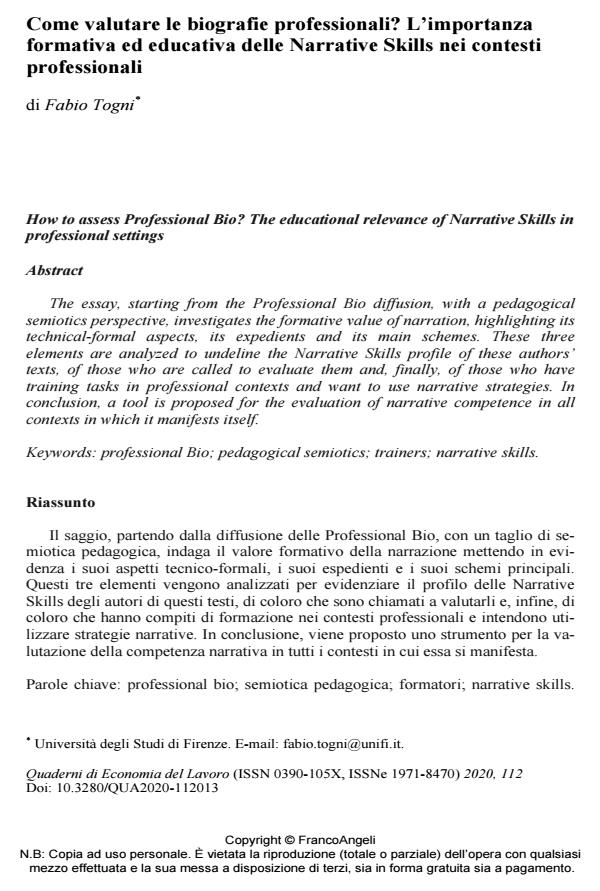How to assess Professional Bio? The educational relevance of Narrative Skills in professional settings
Journal title QUADERNI DI ECONOMIA DEL LAVORO
Author/s Fabio Togni
Publishing Year 2021 Issue 2020/112 Language Italian
Pages 16 P. 199-214 File size 265 KB
DOI 10.3280/QUA2020-112013
DOI is like a bar code for intellectual property: to have more infomation
click here
Below, you can see the article first page
If you want to buy this article in PDF format, you can do it, following the instructions to buy download credits

FrancoAngeli is member of Publishers International Linking Association, Inc (PILA), a not-for-profit association which run the CrossRef service enabling links to and from online scholarly content.
The essay, starting from the Professional Bio diffusion, with a pedagogical semiotics perspective, investigates the formative value of narration, highlighting its technical-formal aspects, its expedients and its main schemes. These three elements are analyzed to undeline the Narrative Skills profile of these authors’ texts, of those who are called to evaluate them and, finally, of those who have training tasks in professional contexts and want to use narrative strategies. In conclusion, a tool is proposed for the evaluation of narrative competence in all contexts in which it manifests itself.
Keywords: Professional Bio; pedagogical semiotics; trainers; narrative skills
- Barthes R. (1964). Structure du fait divers. In Barthes R., Essais critiques. Paris: Seuil (trad. it.: Struttura del fatto di cronaca. In: Barthes R., Saggi crit ici. Torino: Einaudi, 1966).
- Barthes R. (1980). La chambre claire. Note sur la photographie. Paris: Seuil (trad. it.: La camera chiara. Nota sulla fotografia. Torino: Einaudi, 2003, 2 ed.).
- Bertagna G. (2011). Lavoro e formazione dei giovani. Brescia: La Scuola.
- Bertagna G. (2013). Playdoier dell’educazione e della pedagogia. In: Atti Scholè, Pedagogia e Neuroscienze. Brescia: La Scuola.
- Berti E. (1989). Le ragioni di Aristotele. Bari: Laterza.
- Boffo V. (2020). Storytelling and Other Skills: Building Employability in Higher Education. In: Egetenmeyer R., Boffo V. e Kröner S., International and Comparative Studies in Adult and Continuing Education. Firenze: Firenze University Press.
- Bremond C. (1973), Logique du récit, Paris, Seuil (trad.it.: Logica del racconto. Milano: Bompiani, 1977).
- Bruner J. (1990). Acts of Meaning. Cambridge MA-London: Harvard University Press (trad. it.: La ricerca del significato. Per una psicologia culturale. Torino: Bollati Boringhieri, 1992).
- Cambi F. (2019). La pedagogia tra educazione e formazione. Dibattito. Nuova Secondaria, XXXVI(7): 9-11.
- Demetrio D. (2012). Educare è narrare. Le teorie le pratiche, la cura. Milano: Mimesis.
- Eco U. (1979). Lector in fabula. Milano: Bompiani.
- Ferraro G. (2020). Teorie della narrazione. Dai racconti tradizionali all’odierno storyte lling. Roma: Carocci.
- Greimas A.J. (1976). Maupassant. La sémiotiq ue du texte: exercises pratiques. Paris: Seuil (trad.it.: Maupassant. Esercizi di semiotica del testo. Torino: Centro Scientifico Editore, 1995).
- Guilford J.P. (1967). Creativity: Yesterday, today, and tomorrow. The Journal of Creative Behavior, 1(1): 3-14.
- Labov W. e Waletsky J (1967). Narrative Analysis: Oral version of personal experience. In: Helms J., a cura di, Essays on Verbal and Visual Arts. Seattle: University of Washington Press.
- Meister J.C. (2003). Computing Action: A narratological Approach. Berlin-New York: Wal-ter de Gruyter.
- Prince G. (1982). Narratology: The form and Functioning of Narrative. Mounton: Berlin (trad. it.: Narratologie. Parma: Pratiche, 1984).
- Ricoeur P. (1983). Temps et Recit. Tome 1. Paris: Seuil (trad. it.: Tempo e Racconto. Milano: Jaka Book, 1983)
- Ricoeur P. (1984). Temps et récit. Tome 2. La configuration dans le récit de fiction. Paris: Seuil (trad. it.: Tempo e racconto. La configurazione del racconto di finzione. Milano: Jaka Book, 2008, 2 ed.).
- Ricoeur P. (1990), Soi-même comme un autre. Paris: Seuil (trad. it.: Sé come un altro. Mila-no: Jaka Book, 1992).
- Ricoeur P. (1993). L’attestazione tra fenomenologia e ontologia. Milano: Margini.
- Schön D.A. (1983). The reflective Practitioner. How Professionals think in action. Boston: Basic Book (trad.it.: Il professionista riflessivo. Per una nuova epistemologia della prati-ca professionale. Roma: Dedalo, 1993).
- Entrepreneurial organization in higher education: Professional and educational answers to the crisis: The pandemic and more Vanna Boffo, Fabio Togni, in Andragoske studije /2021 pp.21
DOI: 10.5937/AndStud2101021B
Fabio Togni, Come valutare le biografie professionali? L’importanza formativa ed educativa delle Narrative Skills nei contesti professionali in "QUADERNI DI ECONOMIA DEL LAVORO" 112/2020, pp 199-214, DOI: 10.3280/QUA2020-112013